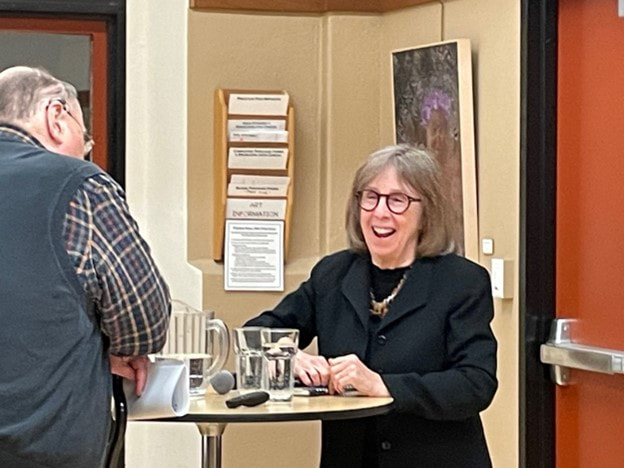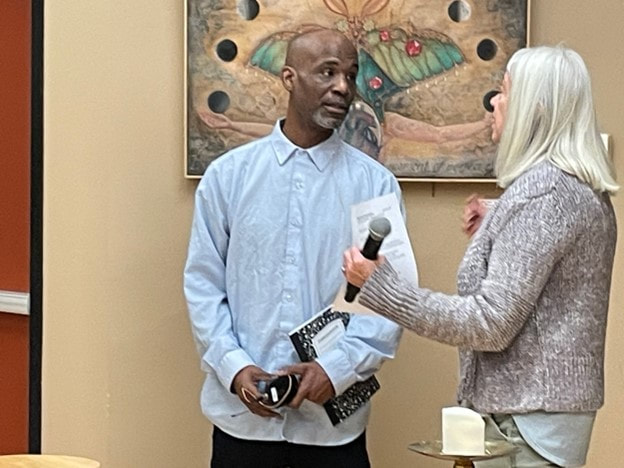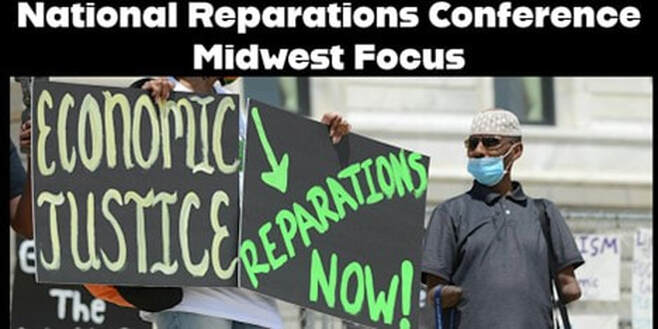|
Shelley Butler, Beloved Community Communications Team No Question That Reparations Are Owed After coming into the Parish Hall for Wellspring Wednesday on January 31, 2024, and saying hey to a few people, I took a spot at the front in one of the only seats left for the panel discussion, “The Process of Politics and Reparations in Saint Paul,” sponsored by the Unity Racial and Restorative Justice Team. Unity member Russel Balenger spoke about being a descendent of enslaved people, and about growing up in Rondo before being displaced. In a brief film, we heard Bridgett Floyd, sister of George Floyd, speak about the enslaved ancestors who managed to acquire several hundred acres of farmland in the South after emancipation only to have it stolen from them. Our country and our state of Minnesota were built on stolen land and free labor. Reparations are not an abstract idea relating to people over 100 years ago. The action is personal to Russel and Bridgett and every descendent of an enslaved family member. And it is about the continuing legacy of slavery: trauma, lost generational wealth, health care issues, housing discrimination, disproportional imprisonment, the destruction of the Rondo neighborhood, and more. We learned that Minnesota has the third-largest racial wealth gap in the country. It should be personal to all of us. Jane Prince has worked on reparations for years and is now fresh off the City Council and a Unity Church member. She said, “Reparations [are] a federal debt.” The work in St. Paul is a start, as are the 116 other proposals to do with reparations that have passed around the country. Reparative Work by the St. Paul City Council To bring us up to date, Trahern Crews, a Black Lives Matter Minnesota leader and one of the conveners of St Paul’s Reparations Advisory Committee, walked us through the years of study and work completed by himself, Balenger, Prince, and many others that led to successful reparations work in St. Paul. Highlights include:
Independent of the City Council, Mayor Melvin Carter established the Rondo Inheritance Fund to help displaced Rondo families purchase housing. And while information on the Inheritance Fund is on the city website under “City Council Reparations Efforts,” it is not related to the commission. Due to a large number of applicants, the city is no longer taking applications for this fund. What You Can Do Right Now The history so far is important, but to hear direct-experience testimony is to witness the pain and hopefully, to become allies in the work of reparations. Thus, the call to immediate action. Here’s what you can do:
Questions for Further Thought
0 Comments
Leave a Reply. |
Topics
All
Beloved Community ResourcesUnity Justice Database
Team Dynamics House of Intersectionality Anti-Racism Resources in the Unity Libraries Collection Creative Writers of Color in Unity Libraries The History of Race Relations and Unity Church, 1850-2005 Archives
July 2024
Beloved Community Staff TeamThe Beloved Community Staff Team (BCST) strengthens and coordinates Unity’s antiracism and multicultural work, and provides opportunities for congregants and the church to grow into greater intercultural competency. We help the congregation ground itself in the understanding of antiracism and multiculturalism as a core part of faith formation. We support Unity’s efforts to expand our collective capacity to imagine and build the Beloved Community. Here, we share the stories of this journey — the struggles, the questions, and the collaborations — both at Unity and in the wider world.
The current members of the Beloved Community Staff Team include Rev. Kathleen Rolenz, Rev. KP Hong, Rev. Lara Cowtan, Drew Danielson, Laura Park, Lia Rivamonte and Angela Wilcox. |


